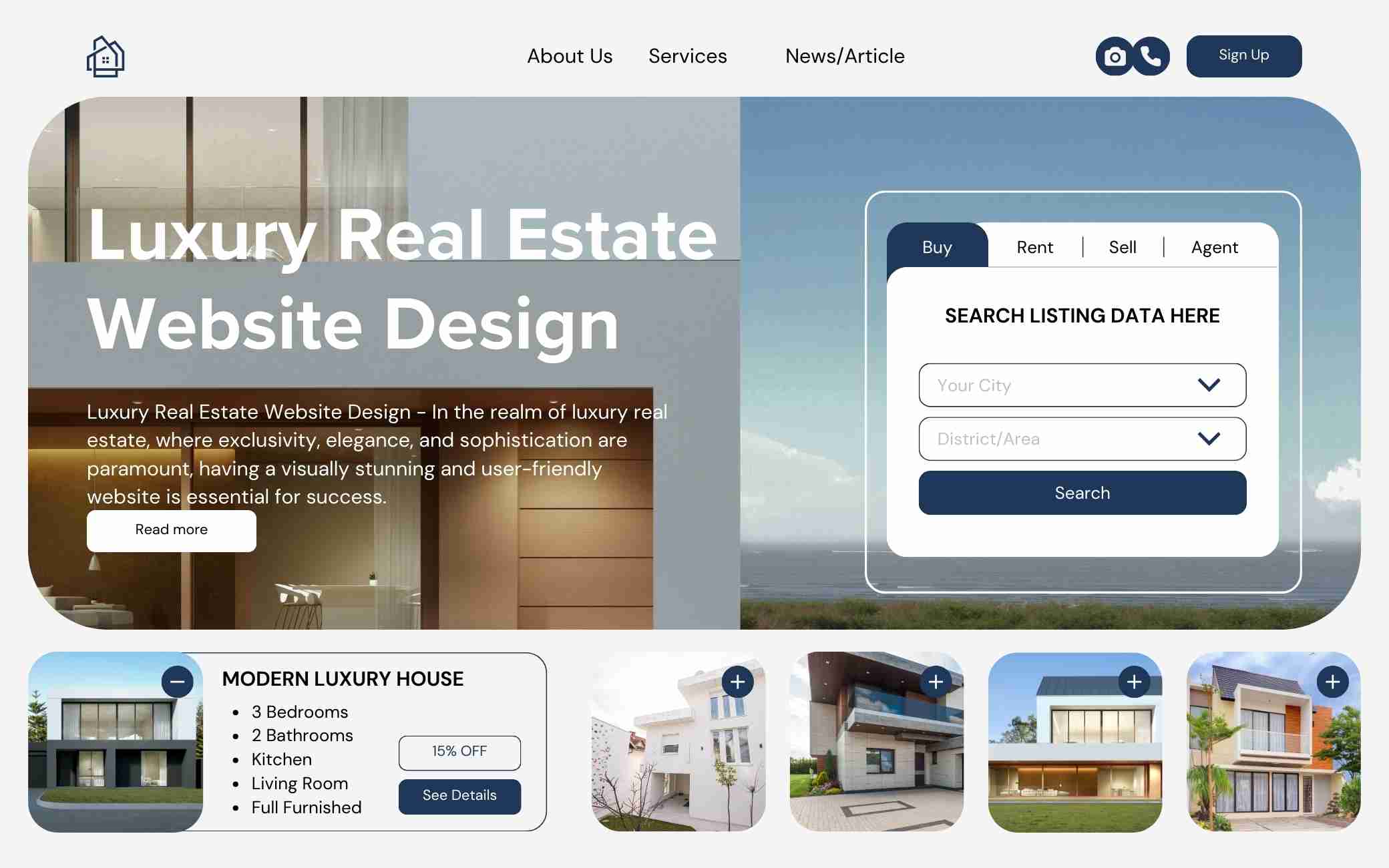Luxury Real Estate Website Design: The Ultimate Guide

Luxury Real Estate Website Design – In the realm of luxury real estate, where exclusivity, elegance, and sophistication are paramount, having a visually stunning and user-friendly website is essential for success. A luxury real estate website serves as the digital storefront for high-end properties, catering to discerning clients who demand excellence in every aspect of their property search. In this comprehensive guide, we’ll explore the intricacies of luxury real estate website design, from aesthetics and functionality to user experience and search engine optimization (SEO).
The Ultimate Guide to Luxury Real Estate Website Design
A. Understanding the Luxury Real Estate Market
Before delving into the specifics of website design, it’s crucial to grasp the unique characteristics of the luxury real estate market. Unlike traditional real estate, which focuses primarily on meeting basic housing needs, luxury real estate caters to affluent clientele seeking exceptional properties with distinctive features, amenities, and locations. These clients value privacy, exclusivity, and superior quality, and they expect nothing less when browsing properties online.
Luxury real estate encompasses a diverse range of properties, including high-end homes, penthouses, waterfront estates, luxury condominiums, and sprawling estates. Each property has its own story to tell, and it’s essential for a luxury real estate website to convey the allure and prestige of these properties effectively.
B. Key Elements of Luxury Real Estate Website Design
Creating a luxury real estate website requires careful attention to detail and a focus on delivering a premium experience for users. Here are some key elements to consider when designing a luxury real estate website:
1. Elegant Visual Design
- The visual design of a luxury real estate website should reflect the sophistication and exclusivity of the properties it showcases. This involves using high-quality images and videos to highlight the unique features and architectural details of each property. Minimalistic yet elegant design elements, such as clean layouts, ample white space, and tasteful typography, can enhance the overall aesthetic appeal of the website.
2. High-Quality Imagery and Video
- In the luxury real estate market, visuals play a crucial role in capturing the attention of potential buyers. Investing in professional photography and videography is essential for showcasing properties in the best possible light. High-resolution images and immersive videos allow users to experience the property virtually and get a sense of its scale, design, and ambiance.
3. Intuitive User Interface (UI)
- A luxury real estate website should have an intuitive and user-friendly interface that makes it easy for visitors to navigate and explore properties. Clear navigation menus, prominent search functionality, and intuitive filters can help users find the properties that meet their specific criteria quickly. Additionally, interactive maps and virtual tours can provide a more immersive browsing experience.
4. Mobile Responsiveness
- With an increasing number of users accessing the internet on mobile devices, ensuring that a luxury real estate website is mobile-responsive is essential. A responsive design ensures that the website adapts seamlessly to different screen sizes and devices, providing an optimal viewing experience for users on smartphones and tablets.
5. Property Listings and Search Functionality
- An effective property listing system is the backbone of any luxury real estate website. Properties should be presented in a visually appealing and organized manner, with detailed descriptions, high-quality images, and key features prominently displayed. Advanced search functionality, including filters for price, location, amenities, and property type, allows users to refine their search and find properties that meet their specific criteria.
6. Lead Capture and Contact Forms
- Capturing leads is a crucial aspect of any real estate website, and luxury real estate is no exception. Contact forms strategically placed throughout the website allow visitors to inquire about properties, schedule viewings, or request more information. Integrating lead capture forms with customer relationship management (CRM) systems enables agents to manage leads effectively and nurture relationships with potential buyers.
7. Integration with MLS and Other Data Sources
- Integrating a luxury real estate website with multiple listing service (MLS) databases and other data sources allows agents to access a comprehensive inventory of properties and keep listings up to date. Real-time synchronization ensures that users have access to the latest property listings and market data, enhancing the credibility and reliability of the website.
8. Personalized Content and Recommendations
- Personalization is key to engaging luxury real estate clients and providing a tailored browsing experience. By leveraging data analytics and user behavior tracking, a luxury real estate website can offer personalized property recommendations based on a user’s preferences, search history, and demographic information. Providing curated content, such as market insights, neighborhood guides, and lifestyle articles, adds value to the user experience and positions the website as a trusted resource for luxury real estate information.
9. Social Proof and Testimonials
- In the luxury real estate market, reputation and trust are paramount. Incorporating social proof elements, such as client testimonials, case studies, and awards, can help build credibility and instill confidence in potential buyers. Highlighting successful transactions and positive experiences reinforces the expertise and track record of the real estate agency or brokerage behind the website.
10. Security and Privacy Measures
- Given the sensitive nature of luxury real estate transactions, security and privacy are of utmost importance. Implementing robust security measures, such as SSL encryption, secure payment gateways, and data protection protocols, helps safeguard sensitive information and instills trust in users. Clearly communicating the website’s privacy policy and adherence to regulatory standards demonstrates a commitment to protecting user data and privacy.
C. Best Practices for Luxury Real Estate Website Design
In addition to incorporating the key elements mentioned above, following best practices can further enhance the effectiveness and performance of a luxury real estate website:
1. Showcase Featured Properties
- Highlighting featured properties prominently on the homepage or dedicated sections of the website can capture the attention of visitors and showcase the best offerings in the portfolio. These properties are typically high-end listings with unique features or exceptional value, serving as flagship offerings that reflect the prestige of the real estate agency or brokerage.
2. Create Compelling Property Descriptions
- Crafting compelling and descriptive property descriptions is essential for capturing the imagination of potential buyers. Use evocative language to highlight the unique selling points and lifestyle benefits of each property, painting a vivid picture of the luxury living experience it offers. Incorporating storytelling elements can evoke emotion and create a sense of aspiration and desire among prospective buyers.
3. Optimize for Search Engines
- Search engine optimization (SEO) is critical for ensuring that a luxury real estate website ranks well in search engine results and attracts organic traffic. Conduct keyword research to identify relevant search terms and phrases used by potential buyers, and optimize website content, metadata, and image tags accordingly. Creating informative blog posts, neighborhood guides, and market reports can also improve search visibility and establish authority in the luxury real estate niche.
4. Leverage Video Marketing
- Video has become increasingly popular in real estate marketing, offering a dynamic and engaging way to showcase properties and engage with potential buyers. Create property videos, virtual tours, and neighborhood highlights to provide immersive experiences that resonate with affluent clientele. Share videos on social media platforms, video hosting sites, and email newsletters to reach a wider audience and drive traffic to the website.
5. Implement Live Chat Support
- Offering live chat support on a luxury real estate website can enhance customer service and facilitate real-time communication with potential buyers. A dedicated team of agents or concierge staff can assist visitors with inquiries, provide additional information about properties, and schedule viewings or consultations. Live chat also allows agents to engage proactively with website visitors and nurture leads through personalized interactions.
6. Invest in Professional Branding
- Building a strong and memorable brand identity is essential for standing out in the competitive luxury real estate market. Invest in professional branding elements, including a distinctive logo, color scheme, and visual assets, that reflect the values and aesthetic of the brand. Consistent branding across all touchpoints, from the website to marketing materials and signage, reinforces brand recognition and fosters trust among clients.
7. Monitor Analytics and Performance Metrics
- Tracking website analytics and performance metrics provides valuable insights into user behavior, engagement levels, and conversion rates. Use tools like Google Analytics to monitor traffic sources, user demographics, and popular content on the website. Analyzing these metrics allows real estate agents and marketers to identify areas for improvement, optimize marketing strategies, and enhance the overall effectiveness of the website.
8. Offer Virtual Reality (VR) and Augmented Reality (AR) Experiences
- Virtual reality (VR) and augmented reality (AR) technologies offer innovative ways to showcase luxury properties and provide immersive experiences for potential buyers. Create virtual tours and 3D walkthroughs that allow users to explore properties from the comfort of their homes, gaining a realistic sense of scale and spatial layout. AR apps can also overlay digital information onto real-world environments, enabling users to visualize furniture placement, interior design options, and renovation possibilities.
9. Cultivate Relationships with Affluent Clients
- Building strong relationships with affluent clients is essential for long-term success in the luxury real estate market. Focus on delivering exceptional service, personalized attention, and discreet representation to high-net-worth individuals and luxury property owners. Cultivate a reputation for integrity, professionalism, and discretion, and leverage personal connections and networking opportunities to expand your client base and attract referrals.
10. Stay Ahead of Trends and Innovations
- The luxury real estate market is constantly evolving, driven by changing consumer preferences, technological advancements, and market dynamics. Stay informed about emerging trends, innovations, and best practices in real estate marketing and technology. Attend industry conferences, participate in professional development programs, and collaborate with experts and thought leaders to stay ahead of the curve and maintain a competitive edge in the luxury real estate sector.
Conclusion: Luxury Real Estate Website Design
Designing a luxury real estate website that embodies elegance, sophistication, and functionality requires a meticulous approach and a deep understanding of the unique needs and preferences of affluent clientele. By incorporating elegant visual design, high-quality imagery, intuitive user interface, and advanced features such as personalized content, virtual tours, and live chat support, real estate professionals can create a compelling online experience that resonates with luxury buyers and sellers.
By following best practices, staying abreast of industry trends, and leveraging innovative technologies, luxury real estate websites can differentiate themselves in a crowded marketplace and attract discerning clients seeking exceptional properties and personalized service. With attention to detail, creativity, and a commitment to excellence, luxury real estate professionals can elevate their online presence and establish themselves as leaders in the luxury real estate market.
Recommended Posts

Local SEO vs. Global SEO: A Comprehensive Guide
May 14, 2025



